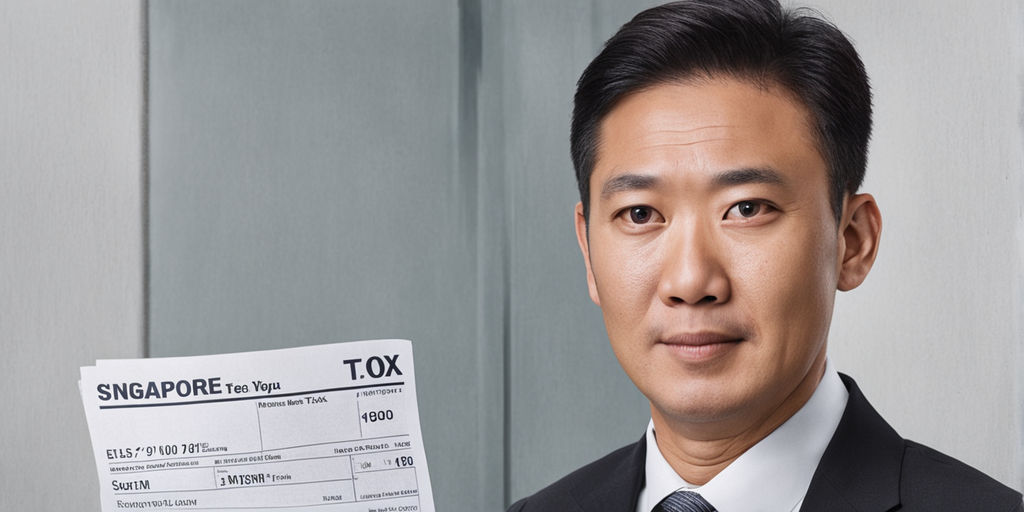
If you’re living and working in Singapore, it’s important to understand how much tax is deducted from your salary. The Singaporean government uses a progressive tax system, which means that the more you earn, the higher the percentage of your income you’ll pay in taxes. However, there are also various deductions and reliefs available that can help reduce your tax bill.
As an employee in Singapore, you’ll be subject to income tax on your salary. The exact amount of tax you’ll pay depends on a number of factors, including your income level, tax residency status, and any deductions or reliefs you’re eligible for. In general, residents are subject to lower tax rates than non-residents, and there are also different tax rates for different income brackets.
Key Takeaways
- Singapore uses a progressive tax system, which means that the more you earn, the higher the percentage of your income you’ll pay in taxes.
- There are various deductions and reliefs available that can help reduce your tax bill.
- The exact amount of tax you’ll pay depends on your income level, tax residency status, and any deductions or reliefs you’re eligible for.
Understanding Singapore’s Tax System

If you are working in Singapore, it is important to understand the country’s tax system. Singapore has a progressive tax system, which means that the more you earn, the higher the tax rate you will pay. In this section, we will discuss the basics of Singapore’s tax system, including tax residency status and the types of income that are taxable.
Tax Residency Status
Your tax residency status in Singapore will determine how much tax you need to pay. If you are a tax resident in Singapore, you will be taxed on all income earned in Singapore as well as any income earned overseas that is brought into Singapore. On the other hand, if you are a non-resident, you will only be taxed on income earned in Singapore.
To be considered a tax resident in Singapore, you must meet one of the following criteria:
- You have been in Singapore for 183 days or more in the previous year; or
- You are a Singapore Permanent Resident (PR) who has established a home in Singapore; or
- You are a foreigner who has worked in Singapore for at least 183 days in the previous year.
Types of Income Taxable
In Singapore, there are three types of income that are taxable: employment income, trade income, and investment income. Employment income includes your salary, bonuses, and allowances. Trade income includes income from your business or profession. Investment income includes dividends, interest, and rental income.
The amount of tax you need to pay depends on your chargeable income, which is your total income minus any deductions and reliefs. The tax rates for tax residents in Singapore range from 0% to 22%, while non-residents are taxed at a flat rate of 15% or the resident rates, whichever is higher.
As a Singapore citizen or PR, you may be eligible for certain tax reliefs and rebates. For example, you may be eligible for the Earned Income Relief (EIR) if you are a tax resident and have earned income. The EIR can help to reduce your taxable income and lower the amount of tax you need to pay.
In summary, understanding Singapore’s tax system is important if you are working in the country. Your tax residency status and the types of income you earn will determine how much tax you need to pay. Make sure to take advantage of any tax reliefs and rebates that you are eligible for to lower your tax bill.
Income Tax Rates for Residents

If you are a resident of Singapore, you are subject to personal income tax on your income earned in Singapore. The tax rates are progressive, which means that the more you earn, the higher your tax rate.
Progressive Tax Rates
The progressive tax system in Singapore ensures that those who earn more pay a higher percentage of their income in taxes. The tax rates for residents for the year 2024 are as follows:
| Taxable Income | Tax Rate |
|---|---|
| First $20,000 | 0% |
| Next $10,000 | 2% |
| Next $10,000 | 3.5% |
| Next $40,000 | 7% |
| Next $40,000 | 11.5% |
| Next $40,000 | 15% |
| Next $40,000 | 18% |
| Next $40,000 | 19% |
| Next $40,000 | 19.5% |
| Next $40,000 | 20% |
| Next $40,000 | 22% |
| Above $320,000 | 24% |
As you can see, the tax rate increases as your taxable income increases. However, it is important to note that you will only be taxed on your net income after deducting personal reliefs and expenses.
Personal Income Tax Rates
The personal income tax rates for residents are based on your gross tax payable, which is calculated by applying the progressive tax rates to your taxable income. The gross tax payable is then reduced by personal reliefs and deductions to arrive at your net tax payable.
The personal income tax rates for residents range from 0% to 24%, depending on your taxable income. It is important to note that the tax rates and reliefs are subject to change, so it is always a good idea to check the latest tax rates and reliefs on the IRAS website.
In conclusion, as a resident of Singapore, you are subject to personal income tax on your income earned in Singapore. The tax rates are progressive, which means that the more you earn, the higher your tax rate. However, there are personal reliefs and deductions that can help reduce your tax liability.
Income Tax Rates for Non-Residents

If you are a non-resident in Singapore, you will be subject to a different tax rate compared to residents. As a non-resident, you will not be eligible for any personal reliefs and deductions. Instead, you will be subject to a flat rate of taxation, which is currently 22%. However, from the year of assessment 2024, the tax rate for non-resident individuals will be raised to 24% (IRAS).
Flat Rate Taxation
The flat rate of taxation for non-residents is applicable to all types of income, including employment income, director’s fees, and consultancy fees. However, as a concession, employment income of non-residents is taxed at the higher of a flat rate of 15% or the graduated resident rates with personal reliefs (PwC).
Non-Resident Directors and Consultants
If you are a non-resident director or consultant in Singapore, you will be subject to a different tax rate compared to other non-residents. Non-resident directors and consultants are charged at a higher tax rate of 20% (SBS Group).
It is important to note that the tax rates for non-residents in Singapore are subject to change. Therefore, it is always advisable to check the latest tax rates and regulations before filing your tax returns.
Central Provident Fund (CPF) Contributions

If you’re employed in Singapore, your employer is required to make CPF contributions on your behalf. CPF stands for Central Provident Fund, which is a mandatory savings scheme that helps Singaporeans and Permanent Residents (PRs) save for retirement, healthcare, and housing needs. As an employee, you’ll also need to contribute a portion of your salary to CPF.
CPF Contribution Rates
The CPF contribution rates depend on your age and your monthly salary. For employees aged below 55, the employer’s contribution rate is 17% of your monthly salary, while your contribution rate is 20%. For employees aged 55 and above, the employer’s contribution rate is 13% of your monthly salary, while your contribution rate is 13%.
CPF and Taxable Income
Your CPF contributions are tax-deductible, which means that they can help to reduce your taxable income. However, there are limits to the amount of CPF contributions that can be tax-deductible. For example, the Ordinary Wage (OW) subject to CPF contributions is capped at $6,500 per month, while the Additional Wage (AW) subject to CPF contributions is capped at $37,740 per year.
If your OW and AW exceed these limits, the excess contributions will be taxable. You can use the CPF contribution calculator on the CPFB website to estimate your CPF contributions and tax liability.
As a foreigner working in Singapore on an S Pass or Work Permit, you’ll also need to make CPF contributions. However, the contribution rates are different from those for Singaporeans and PRs. For example, the employer’s contribution rate for S Pass holders is 17% of their monthly salary, while the employee’s contribution rate is 15.5%.
Overall, CPF contributions are an important part of your employment package in Singapore. They help you save for your future needs and also provide tax benefits.
Deductions and Reliefs

When it comes to calculating how much tax is deducted from your salary in Singapore, it’s important to understand the various deductions and reliefs that are available to you. By taking advantage of these, you can significantly reduce the amount of tax you need to pay.
Personal Reliefs
One of the most important types of relief is personal reliefs. These are deductions that you can claim for yourself, your spouse, and your children. Some of the most common personal reliefs include:
- Earned Income Relief: This is a relief that is available to all taxpayers who have earned income. The amount of relief you can claim depends on your age and income level.
- CPF Relief: If you contribute to your Central Provident Fund (CPF), you can claim a relief on the amount you contribute. This can help to reduce your taxable income.
- Parent Relief: If you have children who are under the age of 16, you can claim a relief for each child. The amount of relief you can claim depends on the number of children you have.
- Handicapped Child Relief: If you have a child who is handicapped, you can claim a relief for that child. The amount of relief you can claim depends on the severity of the child’s disability.
Earned Income Relief
Earned Income Relief is a type of personal relief that is available to all taxpayers who have earned income. The amount of relief you can claim depends on your age and income level. For example, if you are under the age of 55 and your earned income is less than S$22,000 per year, you can claim a relief of S$1,000. If you are over the age of 55, you can claim a higher relief.
Tax Deductions
In addition to personal reliefs, there are also various tax deductions that you can claim. These deductions can help to reduce your taxable income and include:
- CPF Contributions: As mentioned earlier, you can claim a relief on the amount you contribute to your CPF. This contribution is also tax-deductible, which means that you can further reduce your taxable income.
- Donations: If you make donations to approved charities, you can claim a deduction on the amount you donate. This can help to reduce your taxable income.
- Course Fees: If you are taking a course that is relevant to your job, you can claim a deduction on the course fees. This can help to reduce your taxable income.
Net Income
Once you have deducted all of your personal reliefs and tax deductions from your income, you will arrive at your net income. This is the amount that you will be taxed on. The tax rates in Singapore are progressive, which means that the more you earn, the higher your tax rate will be.
Overall, by taking advantage of the various deductions and reliefs that are available to you, you can significantly reduce the amount of tax you need to pay. It’s important to keep accurate records of your income and expenses so that you can claim all of the deductions and reliefs that you are entitled to.
Calculating Tax Payable

Calculating your tax payable in Singapore can be a bit confusing, but with the right tools and knowledge, it can be quite simple. In this section, we will discuss how to calculate your tax payable using the income tax calculator and understanding tax brackets.
Using the Tax Calculator
The Income Tax Calculator provided by the Inland Revenue Authority of Singapore (IRAS) is a great tool to help you calculate your tax payable. You can access the calculator on the IRAS website. Once you have entered your income details, the calculator will automatically calculate your tax payable.
To use the calculator, you will need to provide information such as your employment income, bonuses, and other income sources. You will also need to provide information about your tax reliefs and deductions, such as the Earned Income Relief and the CPF Relief.
Understanding Tax Brackets
In Singapore, the tax system is based on a progressive tax structure. This means that the more you earn, the higher your tax rate will be. The tax brackets are divided into different income levels, and each level has a different tax rate.
For example, for the Year of Assessment (YA) 2024, the first $20,000 of your income is tax-free, and the next $10,000 is taxed at a rate of 2%. The tax rate then increases gradually as your income increases.
Knowing your tax bracket can help you understand how much tax you will need to pay and plan accordingly. It is also important to note that your effective tax rate may be lower than your tax bracket rate due to the various tax reliefs and deductions available.
In conclusion, calculating your tax payable in Singapore can be a bit daunting, but with the right tools and knowledge, it can be quite simple. By using the income tax calculator and understanding tax brackets, you can easily calculate your tax payable and plan your finances accordingly.
Additional Income Sources

Apart from your salary, you may have additional sources of income that are taxable in Singapore. Here are some common examples:
Rental Income
If you own a property in Singapore and rent it out to tenants, the rental income you receive is taxable. You will need to declare this income in your tax return and pay tax on it. The amount of tax you pay will depend on your tax residency status and the amount of rental income you receive.
Investment Earnings
If you have investments in Singapore, such as stocks, bonds, or mutual funds, any dividends or interest you receive from these investments are taxable. You will need to declare this income in your tax return and pay tax on it. The amount of tax you pay will depend on your tax residency status and the amount of investment earnings you receive.
It’s important to keep track of all your income sources and declare them accurately in your tax return. Failing to do so may result in penalties and fines.
To make things easier, you can use accounting software or hire a professional accountant to help you manage your finances and ensure that you comply with all tax regulations.
Supplementary Retirement Scheme (SRS)

If you are looking for ways to reduce your tax bill and save for retirement at the same time, the Supplementary Retirement Scheme (SRS) might be a great option for you. The SRS is a voluntary scheme that encourages individuals to save for retirement beyond their CPF savings. By contributing to the SRS, you can enjoy tax relief and accumulate tax-free investment returns until you withdraw your funds.
SRS Contributions
To contribute to the SRS, you need to open an SRS account with any of the three local banks or approved financial institutions. You can contribute up to a maximum of $15,300 per year if you are a Singaporean or Permanent Resident and $35,700 per year if you are a foreigner. The contribution cap includes both your own contributions and any contributions made by your employer on your behalf.
One of the main benefits of contributing to the SRS is that you can enjoy tax relief. The amount of tax relief you can claim depends on your tax bracket. For example, if you are in the highest tax bracket of 22%, you can claim up to $3,366 in tax relief for every $15,300 you contribute to the SRS. That’s a significant amount of tax savings that you can use to boost your retirement savings.
SRS Withdrawals and Tax
When you reach the age of 62, you can start making withdrawals from your SRS account. However, only 50% of your withdrawals are taxable at that time. The other 50% is tax-free. This is known as the “50% tax concession.” The idea behind this concession is to encourage individuals to spread out their withdrawals over a period of time to reduce their tax liability.
It is important to note that if you make a withdrawal before the age of 62, you will be subject to a penalty of 5% on the amount withdrawn and the full amount withdrawn will be taxable. Therefore, it is recommended that you only withdraw from your SRS account after the age of 62 to maximise your tax savings.
In conclusion, the SRS is a great way to save for retirement and reduce your tax bill at the same time. By contributing to the SRS, you can enjoy tax relief and accumulate tax-free investment returns until you reach the age of 62. When you start making withdrawals, only 50% of your withdrawals are taxable, which can help you reduce your tax liability.
Tax Filing Process

If you are an employee in Singapore, you are required to file your income tax return every year. The process is straightforward and can be done online via E-Filing with the Inland Revenue Authority of Singapore (IRAS). Here’s what you need to know:
E-Filing with IRAS
E-Filing is the easiest and quickest way to file your income tax return in Singapore. You can access the IRAS website and log in with your SingPass to start the process. Once you have logged in, you will need to provide your personal details, income information, and any deductions or reliefs that you are eligible for. IRAS will then calculate your tax liability based on the Year of Assessment (YA) and inform you of the amount payable or refundable.
Deadlines and Penalties
The deadline for filing your income tax return is April 15th of the following year. Failure to file your return on time may result in penalties and fines. If you are unable to file on time, you can apply for an extension of the deadline. However, this is subject to approval by IRAS and may be granted only under certain circumstances.
It is important to note that even if you do not receive a notification from IRAS to file your income tax return, you are still required to do so if you have earned taxable income during the YA. Failure to file your return may result in penalties and fines.
In conclusion, filing your income tax return in Singapore is a crucial part of being an employee. With the ease of E-Filing and the support of IRAS, the process is simple and straightforward. Just remember to file on time to avoid any penalties or fines.
Tax Rebates and Concessions

If you are a taxpayer in Singapore, you may be eligible for certain tax rebates and concessions. These are designed to help you reduce your overall tax liability and maximise your tax savings. Here are some of the most common tax rebates and concessions available:
Tax Rebates
Tax rebates are a form of relief that can help you reduce your tax bill. They are typically awarded for specific expenses or activities, such as charitable donations, education expenses, or medical expenses. Some of the most common tax rebates in Singapore include:
- Personal Income Tax Rebate: This rebate is available to all taxpayers and is designed to provide relief for the cost of living. The rebate amount varies from year to year and is announced during the budget.
- Earned Income Relief: This rebate is designed to help low- and middle-income earners and is based on your earned income. The amount of relief you can claim depends on your income level.
- Parenthood Tax Rebate: This rebate is available to parents who have children below 16 years old. The rebate amount depends on the number of children you have.
Tax Concessions
Tax concessions are special provisions in the tax code that allow you to reduce your tax liability based on certain criteria. Some of the most common tax concessions in Singapore include:
- Supplementary Retirement Scheme (SRS) Relief: This concession is designed to encourage retirement savings and allows you to claim tax relief on contributions made to your SRS account.
- Foreign Tax Credit: This concession is designed to prevent double taxation and allows you to claim a credit for foreign taxes paid on income earned overseas.
- Investment Allowance: This concession is designed to encourage investment and allows you to claim a deduction for qualifying capital expenditure.
By taking advantage of these tax rebates and concessions, you can reduce your overall tax liability and keep more of your hard-earned money. Be sure to consult with a tax professional to determine which rebates and concessions you are eligible for and how to claim them.
Other Tax Considerations

Asides from the personal income tax, there are other taxes you need to consider when working in Singapore. These taxes include withholding tax and Goods and Services Tax (GST).
Withholding Tax
If you are a non-resident individual or a foreign company providing services in Singapore, you may be subject to withholding tax. This tax is deducted from your income at the source of payment. The Singapore government requires withholding tax to ensure that taxes are paid on income earned in Singapore, even if the recipient is not a resident. The withholding tax rate is usually 15% of the gross payment, but it varies depending on the type of services provided.
Goods and Services Tax (GST)
The Goods and Services Tax (GST) is a consumption tax that is levied on the supply of goods and services in Singapore. If you are a business owner, you need to register for GST if your taxable turnover exceeds S$1 million per year. You can voluntarily register for GST if your taxable turnover is below S$1 million. The current GST rate is 7%.
As a consumer, you need to pay GST on goods and services that you purchase in Singapore. The GST is included in the selling price of the goods and services. However, some goods and services are exempt from GST, such as financial services, residential properties, and basic food items.
In conclusion, it is important to consider other taxes besides personal income tax when working in Singapore. The Singapore government imposes withholding tax to ensure that taxes are paid on income earned in Singapore, even if the recipient is not a resident. The Goods and Services Tax (GST) is a consumption tax that is levied on the supply of goods and services in Singapore.
Frequently Asked Questions

What’s the minimum earnings threshold to incur income tax in Singapore?
If you are a tax resident in Singapore, you will be taxed on all the income earned in the country. The minimum earnings threshold to incur income tax in Singapore is SGD 22,000 per annum. However, if you are a non-resident, you will be taxed only on the income earned in Singapore.
How can one calculate their income tax online for Singapore?
You can calculate your income tax online for Singapore by using the tax calculator provided by the Inland Revenue Authority of Singapore (IRAS). This calculator takes into account your personal income, tax reliefs, and rebates. You can access the calculator on the IRAS website.
Could you explain the tax relief options available in Singapore?
Yes, there are several tax relief options available in Singapore. Some of the common tax reliefs include personal reliefs, earned income relief, and spouse relief. You can also claim relief for donations made to approved charities and voluntary contributions to your Central Provident Fund (CPF) account.
What are the current income tax rates for expatriates working in Singapore?
The current income tax rates for expatriates working in Singapore are the same as those for Singapore residents. The tax rates are progressive, which means that the more you earn, the higher the tax rate you will pay. For example, if you earn SGD 120,000 per annum, you will pay 11.5% tax on the first SGD 40,000, 15% tax on the next SGD 40,000, and 17% tax on the remaining SGD 40,000.
How does Singapore’s payroll tax rate compare to other countries?
Singapore’s payroll tax rate is generally lower than that of many other developed countries. For example, the payroll tax rate in Singapore is around 17%, whereas in the United States, it can be as high as 37%. However, it’s worth noting that other countries may have different tax structures and may offer different tax reliefs and deductions.
What are the steps to determining personal income tax with IRAS?
The steps to determining personal income tax with IRAS are as follows:
- Determine your tax residency status
- Calculate your chargeable income
- Compute your tax payable
- Claim any tax reliefs and rebates
- Pay your tax by the due date
You can find more detailed information on the IRAS website.

